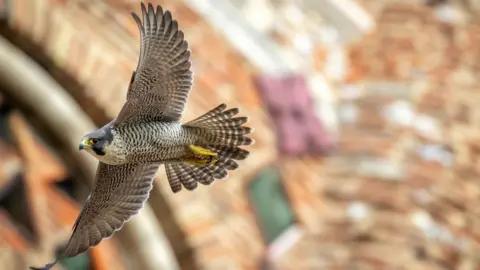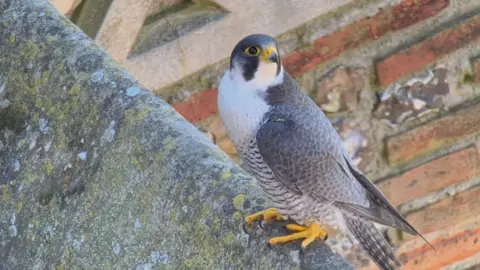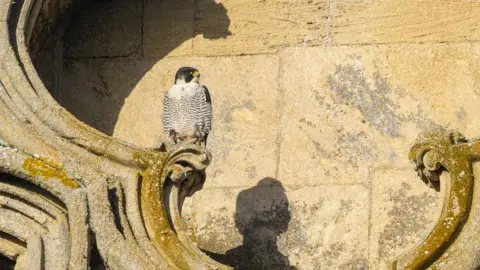St Albans Cathedral becomes home to peregrine falcons
 PATRICK WAINWRIGHT
PATRICK WAINWRIGHTA pair of peregrine falcons are the first to set up home and lay eggs on a cathedral's new nesting tray.
The two birds of prey have set up home at St Albans Cathedral on a tray installed earlier this year as part of the city-wide project.
Herts & Middlesex Wildlife Trust hopes that the birds will return to the nesting tray annually.
Heidi Carruthers, Wilder St Albans project officer, said the birds' arrival was "hugely exciting".
St Albans City and District Council has worked with the wildlife trust to install a gravel-lined tray for the birds to use for nesting.
Ms Carruthers said: "Peregrine falcons are such an iconic species, so it's fantastic to see them in the skies over St Albans.
"We're keeping our fingers crossed that the eggs hatch safely and the chicks fledge successfully."
 BARRY TREVIS
BARRY TREVISThe peregrines are one of five pairs known to be breeding in Hertfordshire, with others spotted in Watford, Hemel Hempstead, Welwyn Garden City and Wymondley.
Local ornithologist and licensed bird-ringer Barry Trevis said: "It is very important to monitor the breading success of the birds, along with their survival rates and movements."
Now that the birds have made a home for themselves at the cathedral, the wildlife trust says that, due to peregrine's being loyal to their nesting site, they should make St Albans a permanent home.
The countdown has begun for when the eggs will hatch, with the wildlife trust expecting sightings from mid-June.
The nesting tray has been fixed high up on the cathedral and is out of sight behind a parapet, but birdwatchers on the ground can see the peregrines coming and going.
Next winter, the wildlife trust hopes to install a camera to provide live feeds from the nesting tray, if it can get the funding.

 Simon Stirrup
Simon StirrupPeregrine falcon
- top flying speed of 180mph (290km/h) when diving - making it the planet's fastest animal
- about 1,500 breeding pairs in UK
- hen lays 3-4 eggs a year
- UK birds remain resident all year round, with others visiting from northern Europe
Source: British Trust for Ornithology

Find BBC News: East of England on Facebook, Instagram and Twitter. If you have a story suggestion email [email protected]
